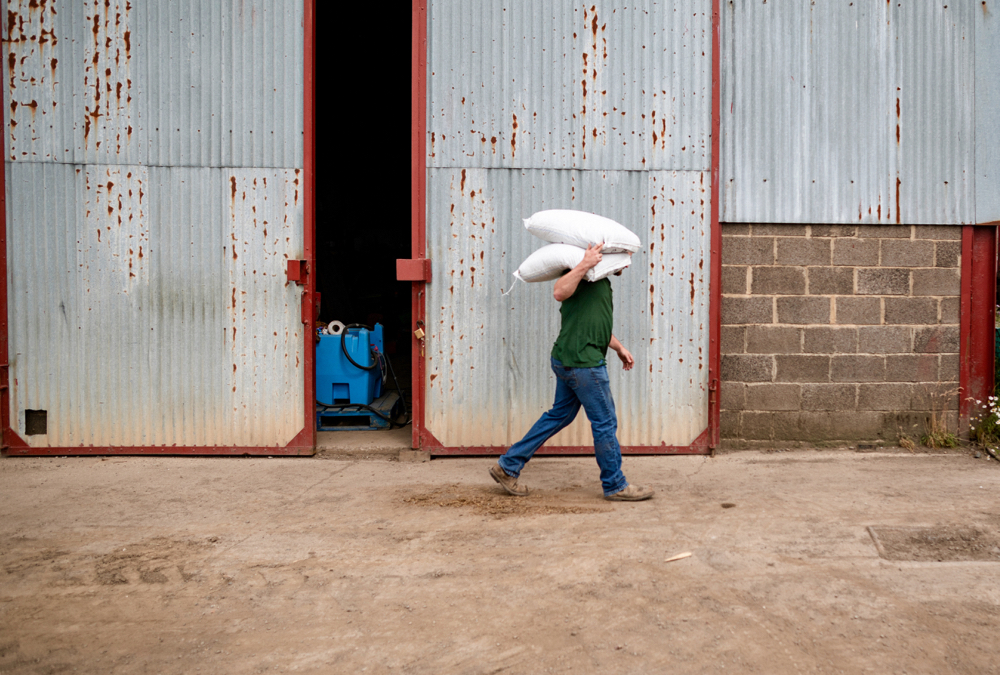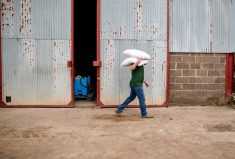A farm kid from Germany, Sweden or Switzerland might be the answer to labour needs, but it’s neither simple nor straightforward to bring such a person to Canada to work on your farm.
Experiences with international labour were among the topics at a Manitoba Ag Days panel discussion among farmers and immigration consultants.
Chris Raupers farms northwest of Brandon near Cardale and his family farm hired international student labour for several years following their own immigration from Germany.
Read Also

AAFC organic research program cut
Canada’s organic sector says the loss of a federal organic research program at Swift Current, Sask., will set the industry back.
“My father worked with a local full-time employee,” Raupers said. “For the extra seats that we needed filled at peak periods, we used German students.”
Why it matters: Canada has a farm labour crisis, and rural youth from other countries might be part of the solution.
As German expats, the Raupers found the process simpler than it would be for many other farmers in Manitoba. It amounted to simple word of mouth back in Germany among friends of his father.
“They’d tell young people there, ‘I have a friend farming in Canada’ and put us in touch,” Raupers said.
That system lasted for years. In early 2020, when COVID-19 made worker visas almost unattainable, the conveyor belt stopped. Within half a year, the farm was forced to build a local work force.
It wasn’t impossible, but it wasn’t simple either. Raupers posted job openings across the country on marketplace websites and leaned on his personal network of friends and work colleagues to spread word of the opportunities.
[RELATED] Make sure even short-term employees aware of safety hazards
For the first time in his career, he could contrast the benefits and challenges of each work force, domestic and imported. Both were able to get the job done, but the imported workers required more constant effort.
“I spent a lot of time telling them where ‘that’ tool was or where ‘that’ machine went,” he said. “I’d send them to the field and then have to follow them a bit later to make sure they got there.”
The domestic workers initially required the same effort, but after the first year, Raupers found that workforce stability began to pay dividends.
“The second and third year, it freed up a lot of time,” he said.
Popular destination
That stability came at a price. Raupers found that domestic workers, while saving time in the long term, were also more expensive than the enthusiastic young Europeans who viewed the whole thing as an adventure.
“I had to reach pretty deeply into my back pocket,” Raupers said.
For the average Manitoban, an exotic locale likely evokes thoughts of Hawaii or the South Pacific. But to many young Europeans, Canada is a dream destination, according to Anita Warriner, executive director of International Rural Exchange Canada (IREC).
The organization facilitates the employment of young Canadians on farms abroad, as well as connecting young workers from other countries with farms here.
Canada’s wide open spaces and natural beauty are big attractions for young people globally, she said, and the scope of farms also catches their attention.
“The big fields and big equipment are a real draw, especially in Europe,” said Warriner.
She first got involved with IREC as a client who employed young people from Western European countries on her farm from 2003 onward. Warriner later jumped to the other side of the organization, serving on the board before becoming its executive director in 2010.
Workers generally come through three streams, she said, none of which require a labour market assessment to satisfy the federal immigration apparatus.
There are what are known as “working holidays,” which are open to participants from more than 30 countries. They can work at any business in Canada, don’t need formal training or credentials and must be paid per applicable provincial legislation.
There are also “young professionals” work permits. These are employer specific permits and employees must be paid, at a minimum, per applicable provincial legislation.
The final stream accounts for international “co-op” placements. These are intended to function like a college or university placement and employees can be paid rates different from provincial legislated minimum if both employee and employer agree.
Social skills
The “working holiday” is the most common designation, and while the work component is important, so is the holiday part, Warriner said.
By international agreement with designated countries, Canada allows travellers under 30 years of age to live and work for short periods in the country as a form of cultural exchange and national promotion.
“They need to experience Canadian culture,” Warriner said. “The goal is to have them return home and speak positively of Canada.”
That means opportunities for recreation, travel and meeting others is important to the success of a placement.
Raupers agreed, noting his exchange participants “want to be with you all the time” because this is the adventure they signed up for. It can be good, he added, because there is nearly always a willing set of hands to help with something.
It can also be tiring.
“They require organization. You’ve got to give them opportunities or make sure they have access to a vehicle so they can go places.”
Language barriers are a factor, both Warriner and Raupers said, but it might be lower than some expect. English is a widespread second language in Europe, and most young people have at least some background in the language.
The path to accessing these workers can vary. A farmer can find a youth themselves and secure the visa or work with organizations like IREC, Warriner said.
“You can do it yourself, but you might find it easier to work with someone,” she said.
In Raupers’ case, the future of labour on his farm is likely dual-pronged. He won’t be totally rolling back his local workforce, now that travel to and from Europe is back on track.
“A blend of both local and international will be what I seek out in the future,” he said.
















